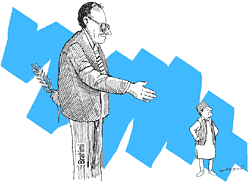 The more things change, the more they remain the same. That is all we have to say on last week's expansion of the ministerial council.
The more things change, the more they remain the same. That is all we have to say on last week's expansion of the ministerial council. Much has been written about the personal history of many of the new inductees but even by the standards of past royal appointees this crass and retrogressive move has elicited overwhelming ridicule. The king's enemies are cheering. Among those who wish for the genuine welfare of the Nepali monarchy, there is now a sense of frantic hopelessness.
It's hard to see how this group of absolutists is going to run day-to-day governance-let alone bring meaningful political and economic reform and restart the peace process. No one in Nepal can now possibly doubt which way the country is headed. You can't fool the people all the time.
The cabinet expansion came soon after pointed warnings from international visitors, the latest being the UN Secretary General's special emissary, Lakhdar Brahimi. He is only sent to places in real crisis or to countries that have imploded. The fact that Brahimi was in Nepal is an ominous sign. The world is worried that our rulers aren't worried.
Another sign that Nepal is now a global hotspot was the visit here by a dozen international press freedom organisations on a fact-finding mission. Their scathing report last week didn't mince words and has tarred the regime's image even further.
The world is one with the Nepali people in understanding that, except for inside the Ring Road, things are getting worse every day. Just read between the lines of the Finance Minister's own budget statement: we are really clutching at straws. This military stalemate is bleeding the country dry and the political paralysis in Kathmandu offers no hope at all.
Before October 2002, there were only two political contestants in the country: constitutional parliamentarians and the Maoist outlaws. After that, and specially in the past six months, the king has presented himself as the third power centre. Had he succeeded in taking either the Maoists or the parties on board, the resulting polarity would have stabilised things. But the country is now stuck in a three-way knot.
We have said in this space many times that the king and the parties have to patch up otherwise the parties and the Maoists will. That was also Brahimi's message. So far, there is too much bad blood for party members to shake the hands of the killers of their colleagues. But it could happen if this deadlock continues.
Last week's council appointments, however, confirmed that the person who should be reading the writing on the wall isn't doing it.


